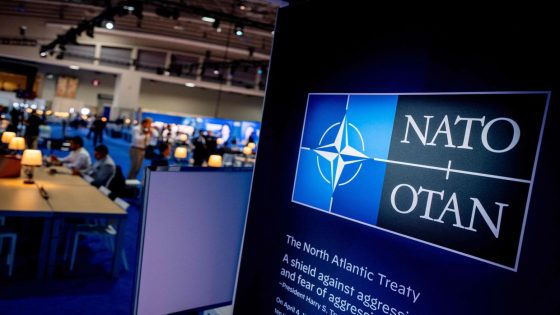Like most 75-year-olds, Nato needs some help reaching out to the younger generation.
The military alliance is this week wrestling with such heady topics as the eventual accession of Ukraine and the ailing health of the octogenarian US president. To stay relevant in the modern era, it has turned to a group of 20-something influencers to spread its message.
The North Atlantic Treaty Organisation invited 16 content creators from countries including the UK, Germany and France with followings on TikTok, Instagram and other social-media platforms to attend its summit in Washington on July 9-11. Another 10 influencers from the US will come at the invitation of the US Defense and State Departments.
The move is an acknowledgment that the traditional media outlets, which are offering wall-to-wall coverage of the summit, may not be reaching Generation Z.
It also shows how long-standing institutions like Nato increasingly need to think outside the box to bolster public support – especially at a time when former US President Donald Trump and other Republicans have advocated for the US to cut spending on European defence.
The alliance paid for the content creators’ travel expenses but doesn’t exert any editorial control over their posts and won’t pay them a fee, according to its spokesman Tom Peyre-Costa.
He didn’t confirm the names of the invited influencers, but the official Nato social media accounts feature an explainer video about the origins of the alliance, narrated by 25-year-old DC social-media fixture and an advocate for “vibrant masculinity”, Anthony Polcari.
“Creators will be given the opportunity to attend the Nato Public Forum and engage with numerous experts and senior Nato and allied officials,” Peyre-Costa said in an email. And it’s not a first – a group of content creators visited Nato headquarters in Brussels in April to mark its 75th anniversary. A similar programme was organised in 2022.
Polcari said in an interview that he was invited to help with the introductory video but was unable to join the influencer programme during the summit due to a scheduling conflict. He believes that content creators like him can help convey Nato’s message to a generation on the cusp of taking power.
“Our generation is going to be taking the reins of power very soon. Many people, a lot smarter than me, are going to be leading this country,” he said. “I think it’s incumbent upon these organisations to make sure that the younger generations know what they do.”
Necessary organisation
At the Canadian embassy in Washington on Tuesday, a 22-year-old Amanda Round sat in the media section listening to Prime Minister Justin Trudeau’s speech on the security implications of climate change. She listened carefully, considering how to convey the day’s events to her 161,700 TikTok followers.
Round said members of her generation don’t really consume traditional media, particularly if it’s behind a paywall. They tend to get their information from social media instead, she said.
She has seen disinformation and misinformation spread like wildfire, and views the invitation from Nato as an important opportunity to help her audience – mostly girls and young women aged 16 to 24 – understand Nato’s importance.
“I believe that it’s a necessary organisation, obviously in our political climate right now in terms of defence, but also in terms of other looming threats such as climate change,” she said in an interview. “I would encourage young people to become more engaged with it.”
The group of nearly 30 influencers in Washington this week has an audience of around 40 million across social media channels, a State Department spokesperson said in an email.
“We know that more and more people are receiving news through social media channels, including via content creators,” the spokesperson said. “During the Nato Summit, we are engaging with these voices to reach additional audiences and explain the importance of the alliance and its 75th Anniversary.” – Bloomberg
Source Agencies




